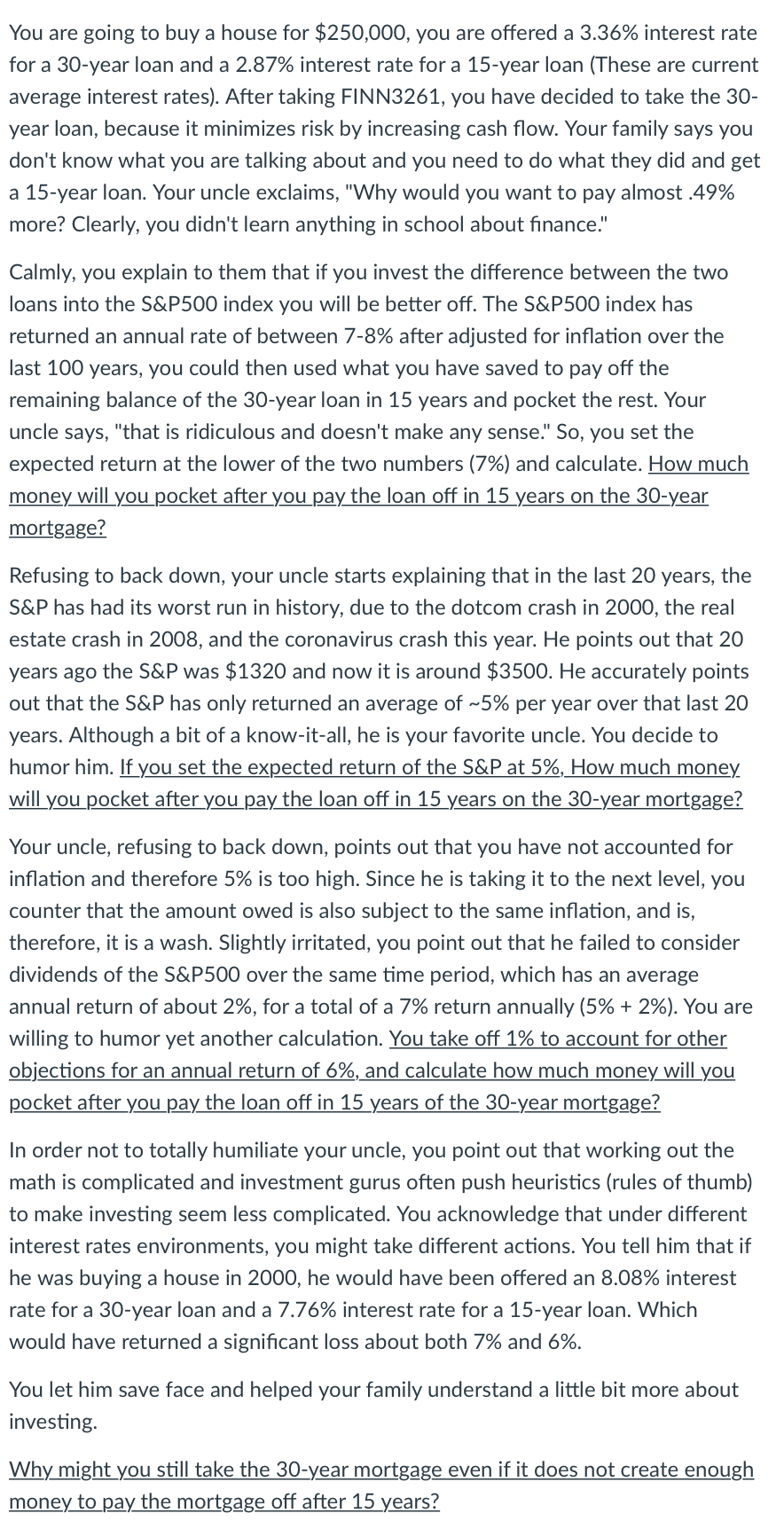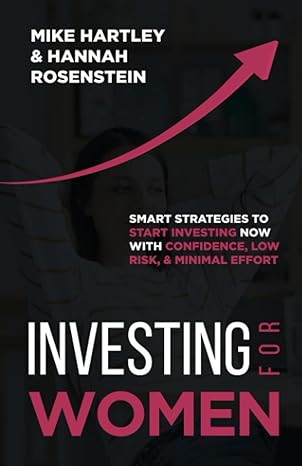Answered step by step
Verified Expert Solution
Question
1 Approved Answer
ALL FOUR UNDERLINED QUESTIONS NEED TO BE ANSWERED. THIS IS ALL ONE QUESTION You are going to buy a house for $250,000, you are offered

ALL FOUR UNDERLINED QUESTIONS NEED TO BE ANSWERED. THIS IS ALL ONE QUESTION
You are going to buy a house for $250,000, you are offered a 3.36% interest rate for a 30-year loan and a 2.87% interest rate for a 15-year loan (These are current average interest rates). After taking FINN3261, you have decided to take the 30- year loan, because it minimizes risk by increasing cash flow. Your family says you don't know what you are talking about and you need to do what they did and get a 15-year loan. Your uncle exclaims, "Why would you want to pay almost .49% more? Clearly, you didn't learn anything in school about finance." Calmly, you explain to them that if you invest the difference between the two loans into the S&P500 index you will be better off. The S&P500 index has returned an annual rate of between 7-8% after adjusted for inflation over the last 100 years, you could then used what you have saved to pay off the remaining balance of the 30-year loan in 15 years and pocket the rest. Your uncle says, "that is ridiculous and doesn't make any sense." So, you set the expected return at the lower of the two numbers (7%) and calculate. How much money will you pocket after you pay the loan off in 15 years on the 30-year mortgage? Refusing to back down, your uncle starts explaining that in the last 20 years, the S&P has had its worst run in history, due to the dotcom crash in 2000, the real estate crash in 2008, and the coronavirus crash this year. He points out that 20 years ago the S&P was $1320 and now it is around $3500. He accurately points out that the S&P has only returned an average of ~5% per year over that last 20 years. Although a bit of a know-it-all, he is your favorite uncle. You decide to humor him. If you set the expected return of the S&P at 5%, How much money will you pocket after you pay the loan off in 15 years on the 30-year mortgage? Your uncle, refusing to back down, points out that you have not accounted for inflation and therefore 5% is too high. Since he is taking it to the next level, you counter that the amount owed is also subject to the same inflation, and is, therefore, it is a wash. Slightly irritated, you point out that he failed to consider dividends of the S&P500 over the same time period, which has an average annual return of about 2%, for a total of a 7% return annually (5% + 2%). You are willing to humor yet another calculation. You take off 1% to account for other objections for an annual return of 6%, and calculate how much money will you pocket after you pay the loan off in 15 years of the 30-year mortgage? In order not to totally humiliate your uncle, you point out that working out the math is complicated and investment gurus often push heuristics (rules of thumb) to make investing seem less complicated. You acknowledge that under different interest rates environments, you might take different actions. You tell him that if he was buying a house in 2000, he would have been offered an 8.08% interest rate for a 30-year loan and a 7.76% interest rate for a 15-year loan. Which would have returned a significant loss about both 7% and 6%. You let him save face and helped your family understand a little bit more about investing Why might you still take the 30-year mortgage even if it does not create enough money to pay the mortgage off after 15 years? You are going to buy a house for $250,000, you are offered a 3.36% interest rate for a 30-year loan and a 2.87% interest rate for a 15-year loan (These are current average interest rates). After taking FINN3261, you have decided to take the 30- year loan, because it minimizes risk by increasing cash flow. Your family says you don't know what you are talking about and you need to do what they did and get a 15-year loan. Your uncle exclaims, "Why would you want to pay almost .49% more? Clearly, you didn't learn anything in school about finance." Calmly, you explain to them that if you invest the difference between the two loans into the S&P500 index you will be better off. The S&P500 index has returned an annual rate of between 7-8% after adjusted for inflation over the last 100 years, you could then used what you have saved to pay off the remaining balance of the 30-year loan in 15 years and pocket the rest. Your uncle says, "that is ridiculous and doesn't make any sense." So, you set the expected return at the lower of the two numbers (7%) and calculate. How much money will you pocket after you pay the loan off in 15 years on the 30-year mortgage? Refusing to back down, your uncle starts explaining that in the last 20 years, the S&P has had its worst run in history, due to the dotcom crash in 2000, the real estate crash in 2008, and the coronavirus crash this year. He points out that 20 years ago the S&P was $1320 and now it is around $3500. He accurately points out that the S&P has only returned an average of ~5% per year over that last 20 years. Although a bit of a know-it-all, he is your favorite uncle. You decide to humor him. If you set the expected return of the S&P at 5%, How much money will you pocket after you pay the loan off in 15 years on the 30-year mortgage? Your uncle, refusing to back down, points out that you have not accounted for inflation and therefore 5% is too high. Since he is taking it to the next level, you counter that the amount owed is also subject to the same inflation, and is, therefore, it is a wash. Slightly irritated, you point out that he failed to consider dividends of the S&P500 over the same time period, which has an average annual return of about 2%, for a total of a 7% return annually (5% + 2%). You are willing to humor yet another calculation. You take off 1% to account for other objections for an annual return of 6%, and calculate how much money will you pocket after you pay the loan off in 15 years of the 30-year mortgage? In order not to totally humiliate your uncle, you point out that working out the math is complicated and investment gurus often push heuristics (rules of thumb) to make investing seem less complicated. You acknowledge that under different interest rates environments, you might take different actions. You tell him that if he was buying a house in 2000, he would have been offered an 8.08% interest rate for a 30-year loan and a 7.76% interest rate for a 15-year loan. Which would have returned a significant loss about both 7% and 6%. You let him save face and helped your family understand a little bit more about investing Why might you still take the 30-year mortgage even if it does not create enough money to pay the mortgage off after 15 yearsStep by Step Solution
There are 3 Steps involved in it
Step: 1

Get Instant Access to Expert-Tailored Solutions
See step-by-step solutions with expert insights and AI powered tools for academic success
Step: 2

Step: 3

Ace Your Homework with AI
Get the answers you need in no time with our AI-driven, step-by-step assistance
Get Started


